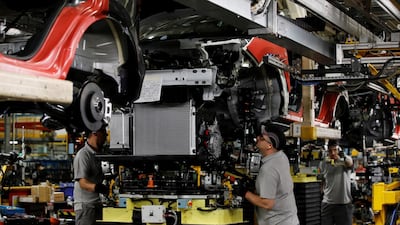Nissan Motor’s Chinese battery partner is planning a UK project “very soon”, its chief executive said, amid expectations that the Japanese carmaker will proceed with expansion plans in Britain.
Nissan may announce an agreement with Envision Group to upgrade a battery factory in Sunderland, England, as soon as this week, a source said.
The confidential project is part of a revamp of the carmaker’s UK electric-car strategy, the source said.
A UK project would put Envision on an expansion course in Europe.
The company plans to spend as much as €2 billion ($2.38bn) on a battery plant in northern France to power a range of Renault electric vehicles.
French President Emmanuel Macron on Monday unveiled the project at Renault’s assembly plant in Douai, site of the Envision battery plant.
It is the first in Europe for the Chinese company, which also makes wind turbines.
Envision’s project in the UK is meant to increase the country’s battery output, chief executive Lei Zhang said at the Renault event.
The project goes beyond supplying Nissan in Sunderland, Mr Lei said, without giving details.
Nissan and Renault are the latest among carmakers to announce plans to expand battery production in Europe in recent months.
This indicates that competition to ensure adequate supply for their electric vehicles is heating up.
UK carmakers are especially dependent on an adequate local production network to avoid tariffs when trading with the EU.
Porsche and Volvo last week announced plans to produce power packs, while Peugeot maker Stellantis will update investors on its EV strategy on July 8.
Volkswagen in March unveiled a multibillion-euro plan for six European battery factories.
Nissan already makes the Leaf electric hatchback in Sunderland and procures batteries for the model from Envision AESC, the battery unit of the Shanghai parent.
In France, the supplier is planning for production of 24 gigawatt-hours worth of batteries by 2030 for the future Renault 5 model. It pledged to create 2,500 jobs by the end of the decade.
Envision’s plans for the Douai site could also go beyond Renault.
Its building permit application is for a capacity of 43 gigawatt hours by the end of the decade, a goal Mr Lei said could be achieved if deals were reached with other carmakers.
Bolstering local battery production will be crucial for UK carmakers after Brexit.
The trade agreement reached at the end of 2020 forces makers to source more of the content going into their vehicles and battery packs locally to qualify for tariff-free trade with the EU.
Nissan sold its controlling stake in its battery operations to Envision in 2018, although it retained a 20 per cent holding of the division.


